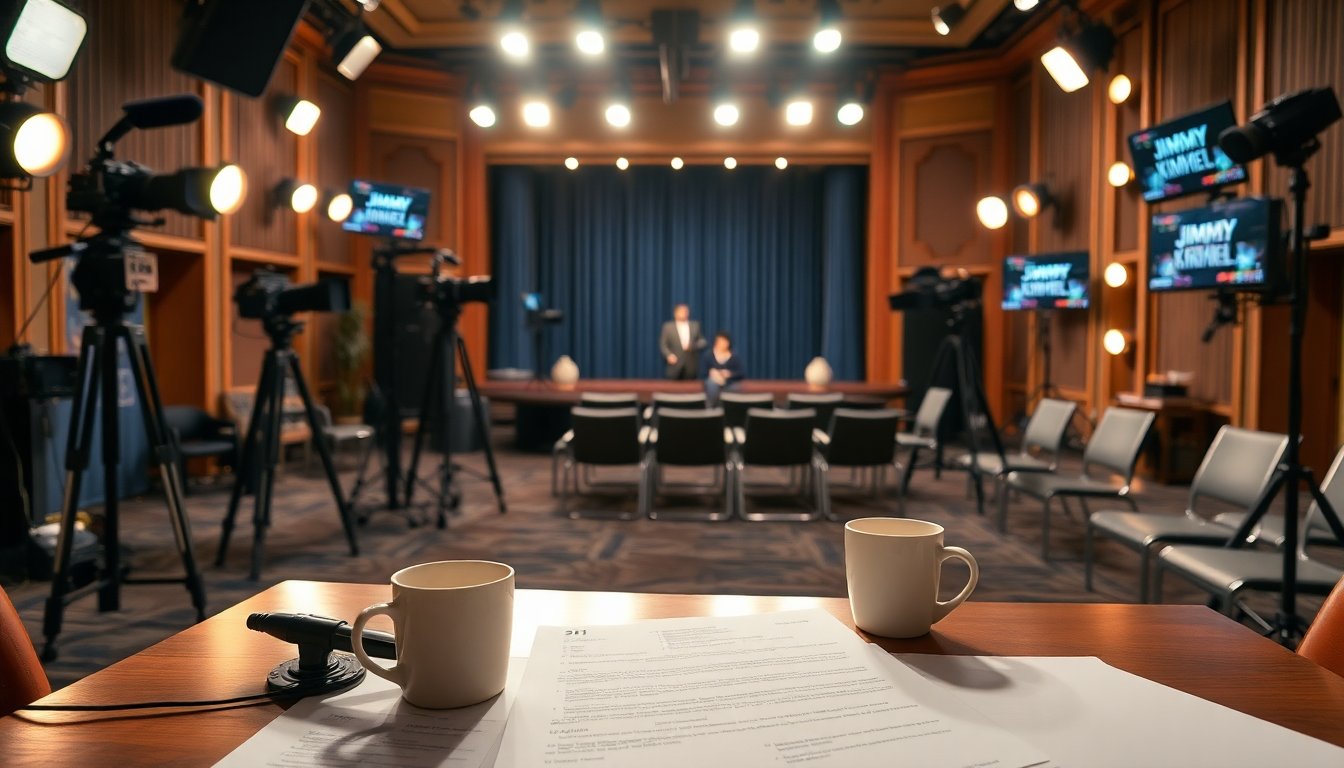Table of Contents
After a brief hiatus, Jimmy Kimmel Live!<\/strong> is set to return this Tuesday, ending a six-day suspension for its host, Jimmy Kimmel<\/strong>. This decision follows significant controversy after Kimmel made comments regarding the assassination<\/em> of political commentator Charlie Kirk<\/strong>. The reactions were swift, leading to the show’s temporary halt.<\/p>
The production pause aimed to address the backlash and prevent further escalation of a sensitive national issue. Disney, the parent company of ABC, stated that Kimmel’s remarks were viewed as ill-timed<\/strong> and insensitive<\/strong> given the current climate in the United States.<\/p>
Hollywood’s Response to Free Speech Concerns<\/h2>
In a show of solidarity, numerous prominent figures from Hollywood and Broadway expressed their concerns over the suspension. Over 430 celebrities, including stars like Robert De Niro<\/strong>, Jennifer Aniston<\/strong>, and Meryl Streep<\/strong>, signed an open letter initiated by the American Civil Liberties Union<\/strong> (ACLU). This letter emphasized the importance of protecting constitutionally protected rights<\/em> amid growing threats to free speech.<\/p>
The Impact of Celebrity Voices<\/h3>
The ACLU’s letter highlighted that this moment represents a critical juncture<\/strong> for free expression in America. Signatories urged the public to recognize the dangers of silencing voices in the entertainment industry, framing the situation as pivotal for the nation’s core values.<\/p>
As Kimmel prepares to return, the narrative surrounding his suspension has sparked discussions about accountability and expression in comedy and talk shows. The entertainment industry’s reaction underscores the belief that every voice carries weight in the ongoing dialogue about freedom of speech.<\/p>
Political Tensions and Broader Sanctions<\/h2>
In a separate but related controversy, the U.S. government has escalated tensions with Brazil through sanctions against various judicial officials. Recent actions include the revocation of visas for six Brazilian officials, including the wife of Supreme Court Justice Alexandre de Moraes<\/strong>. This move is part of a broader strategy by the Trump administration to exert political pressure on Brazil amid ongoing diplomatic strife.<\/p>
These sanctions, under the Global Magnitsky Act<\/strong>, reflect a growing trend of using financial penalties to achieve political goals. The sanctions against Justice de Moraes’ wife, Viviane Barci de Moraes<\/strong>, highlight how intertwined political actions can affect personal lives and international relations.<\/p>
International Human Rights Implications<\/h3>
Meanwhile, on the global stage, former Philippine president Rodrigo Duterte<\/strong> faces grave allegations of crimes against humanity. The International Criminal Court<\/strong> (ICC) has charged Duterte with three counts related to his controversial anti-drug campaign, linked to at least 76 extrajudicial killings. The charges detail operations targeting both high-profile figures and lower-level offenders.<\/p>
The accusations against Duterte serve as a reminder of the serious implications surrounding leadership and accountability for human rights. As the ICC continues its investigations, the international community watches closely, emphasizing the need for justice and human rights protections.<\/p>
Implications for Iranian Diplomacy<\/h2>
In another dimension of international relations, the Trump administration has implemented new restrictions on Iranian diplomats in New York. These regulations require Iranian envoys to obtain explicit approval from the State Department before purchasing luxury goods or holding memberships in wholesale clubs like Costco<\/strong> or Sam’s Club<\/strong>.<\/p>
This directive underscores the ongoing tensions between the U.S. and Iran, highlighting how diplomatic norms are being reshaped under current policies. The measures aim to limit the benefits accessible to Iranian diplomats, illustrating how political climates can directly influence diplomatic activities.<\/p>
Charitable Repercussions for Public Figures<\/h3>
The fallout from controversial remarks extends beyond Kimmel. The Duchess of York<\/strong>, Sarah Ferguson, faced backlash after an email surfaced in which she referred to convicted sex offender Jeffrey Epstein<\/strong> as a “supreme friend.” Multiple charities, including Julia’s House, have distanced themselves from her, deeming her association with Epstein inappropriate.<\/p>
Such reactions reflect the broader societal demand for accountability among public figures, particularly in the wake of serious allegations. The Duchess’s situation serves as a cautionary tale of how past associations can have lasting impacts on public perception and professional affiliations.<\/p>


